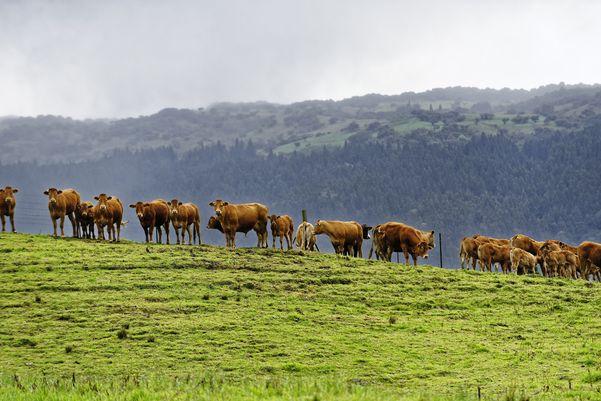- Home
- Worldwide
- CIRAD worldwide
- Projects
- ONE HEALTH FEADER project
Evolving zoonoses and pathogens - ONE HEALTH FEADER

A cattle farm in Reunion Island © R.Carayol, CIRAD
Issues
The last two decades have demonstrated the increasing and potentially devastating impact of emerging human and animal infectious diseases. Zoonoses, infections transmitted from animals to humans or from humans to animals, are constantly evolving. Today, it is considered that 75 % of new diseases emerging in humans originate in domestic or wild animals. Finally, another serious threat is antibiotic resistance. This problem is linked to the excessive consumption of antibiotics not only in human health, but also in livestock farming.
Description
The project is divided into several actions:
- Determining measures to limit the risk of the persistence of Salmonella spp. in broiler chickens in Reunion Island by improving biosecurity rules and supplementing these with innovative control strategies (barrier flora, original decontamination, etc.);
- Studying antibiotic consumption and bacterial resistance in livestock farms in Reunion Island and Mayotte to assess the potential existence of a reservoir in livestock of multi-resistant bacteria with consequences for both animal health and human health;
- Studying the epidemiology of the viruses transmitted by Culicoides, bluetongue disease and epizootic haemorrhagic disease in deer, in Reunion Island;
- Developing tools for epidemiological surveillance in Reunion Island.
Expected changes
- Improvement and development of control strategies for pathogens such as Salmonella, Campylobacter or Listeria in livestock sectors,
- Changes to protocols on antibiotic use thanks to better understanding of emerging antibiotic resistance,
- Detection at the earliest possible stage of known or emerging diseases affecting livestock in Reunion Island.
Expected impacts
Actions on biosecurity will help to improve the health quality of livestock and, by extension, that of the products sold (meat, milk, eggs). This improvement will limit economic losses, improve product image and animal welfare, and increase local value added.
Actions to build knowledge on antibiotics and epidemic diseases, and their sharing with the professional world, will contribute to providing continuous information for veterinary health professionals and livestock farmers.
Project partners
Groupement de Défense Sanitaire (GDS), Reunion Island; DAAF 974; livestock cooperatives; veterinarians; University Hospital of Reunion Island; RITA Elevage, LVD974.
The platform in partnership ONE HEALTH OI has a special relationship with the SEGA One Health network for health surveillance and monitoring organised in collaboration with the health services of its five member states in the Indian Ocean Commission, with the financial support of AFD.
























